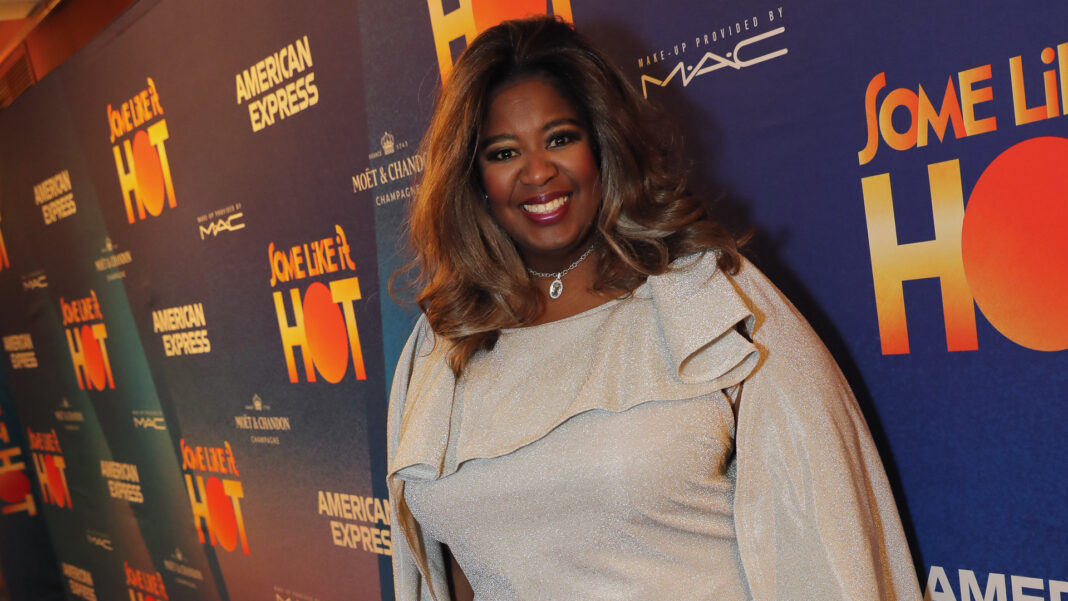How many of us have known from one experience that we had found our path in life? For NaTasha Yvette Williams, currently playing the role of Sweet Sue in the Broadway musical Some Like It Hot, it was attending a performance of the musical Ragtime in 1997. Three years later Williams was touring in Jason Robert Brown‘s Parade.
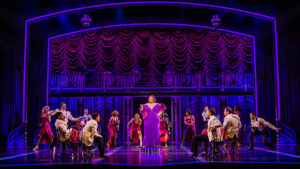
Since then Williams has appeared on Broadway in The Color Purple as Sofia, Porgy and Bess, Waitress, Tina and more. It is her role as the bandleader of an all-female band in need of two additional musicians that opens the musical “so the good times can begin.” Williams gives a performance of such energy that Jesse Green in the New York Times said Sweet Sue “gets a brace of hot jazz numbers that NaTasha Williams…knocks out of the park while incidentally introducing the show’s freedom-for-everyone philosophy.”
Earlier this week I spoke with Williams about the show, the Billy Wilder film on which this (and the 1972 musical Sugar) is based and a life-changing phone call she made to her mother during that performance of Ragtime. What follows are excerpts from my conversation with Williams that have been edited for length and clarity. To see the full interview, please go to our YouTube channel.
Billy Wilder is quoted as having said, “Trust your own instinct. Your mistakes might as well be your own instead of someone else’s.” At what point in your career did you learn to trust your instinct, and how did any mistakes you may have made lead you to the stage of the Shubert Theater in New York appearing as Sweet Sue in Some Like It Hot?
I really feel like I’m still learning that now. But I definitely began to celebrate who I was and not try to fit into other people’s mold. I think right when I took my first Broadway show, which was the original The Color Purple, I was very aware of other people’s demands on me. I was always constantly trying to do what I thought they wanted. That was the first time I said, Look, I really want to be in this show. Let me just do what is best for me. Ater that it just sort of took off.
I’ve certainly made some mistakes. I think a couple of times I chose to not take a job ,or take a job, based on somebody else’s needs. So I think any time I made a mistake, it was always because I was making a choice for someone else as opposed to something that I deep down really thought was best for me.
Why do you think this film – this very unique mix of music, love story, gangsters and cross-dressing – has inspired audiences from the time the movie first came out to now a second Broadway musical?
The movie has those devices, those ideas, those personalities that resonate with people today and resonated with people in 1959. I think the genius of everyone involved in the movie speaks for itself. That is why the movie has stood the test of time as one of the best movies ever. I think the musical has the challenge of not only honoring the movie and all of the people that love it, but also making it current and coming into the day.
Do you think there’s something at the heart of this story in terms of wanting love and wanting to find the perfect person?
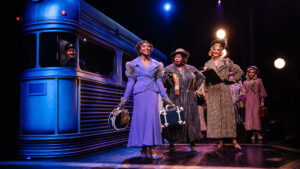
I think we all want to be loved and needed and appreciated. That’s a very basic human need. Every character in the story, not just the two guys who are running for their lives, has those issues and those desires and are pursuing them. Whatever your need as a human, as an audience member, you can find it in the show.
Sue has decided to leave working for somebody else, start her own band and make it happen, even though she needs investors and all this stuff. But she’s decided I’m not working for anybody else anymore. Let me get a band together. Let me go.
As you get to know these characters everybody in the audience can identify with one or more of them in terms of the need to be loved, accepted, to be successful, to be safe, to be appreciated for who you are at the very basic point of who you are, to be accepted for who that is.
I was looking at the character of Sweet Sue in the film and I think her screen time in the movie is shorter than your opening number What Are Your Thirsty For? How is Sweet Sue, from your perspective as the artist bringing her to life in this musical, different than the Sweet Sue that we see in the film?
Well, it is very different. When I got to audition I went back to watch the movie again. I was like, wait a minute. Where is she? What is she doing? They’ve given me these songs so clearly she’s going to be doing more than she was doing in the movie. She’s a combination of Sweet Sue and the manager in the movie [Bienstock]. They combined those characters and fleshed out a little bit more.
We made her be a great big sister, mother figure, auntie figure, for the band. And she gains a lot from that as well. She’s not just giving orders, she’s gaining a family as she takes them on the road. My interpretation of her just became someone who was nurturing, who’s in charge, who wants to make decisions that help herself, as well as the group that is supporting her. So I just took that and ran with it.
There was an interview that co-writer Matthew López gave the New York Times and he talked about Sweet Sue. He said, “Sue always felt to me like a character out of a jazz age movie, except in a way she would never have been depicted at the time.” Do you agree with him? What, if any, conversations have did you have in rehearsals with him or with director/choreographer Casey Nicholaw about how this particular part has been adapted for a modern time?
I think our creative team has been very intentional about the direction that the show has taken in the writing. We are set in the 1930s. I am a Black woman running this band and working and traveling throughout the country. Mostly toward the West so that it is a little safer, but it is still dangerous. It is still during this very challenging time, a time that sort of resembles a lot of what we’re seeing today in terms of racial challenges that we’re having in our country. So I do agree that she would not have been depicted this way.
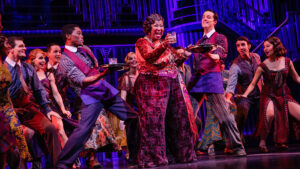
There are some scenes and some moments where I have to really navigate how I’m going to speak to certain people and still maintain the safety and joy in the particular scenes that we’re having. Because of the intention of our creators, Sue travels a road that is difficult, but she’s navigating it very well and not offending people and educating people as to what is possible.
There were a couple of musicals that were based on very popular films that featured men in drag in the last couple of years. There was Mrs. Doubtfire, which did not do well, and Tootsie, which also didn’t do so well. I talked to numerous people who said maybe men in drag is just not that interesting anymore and not that funny. Maybe it’s a tired old trope. This show is succeeding. You are entertaining audiences. You’ve gotten the reviews. What do you think makes the way Some Like It Hot tells its story work in ways that those other musicals were not able to accomplish?
I think it has a lot to do with not making it a trope. Making it just be what these two people had to do in that particular situation. So the jokes don’t come from I’m going to put on a dress and I’m going to sway a certain way. I’m going to talk a certain way to depict what I think a woman is or what I think a man is dressed as a woman. What I think a drag performer would do. None of the scenes are like that.
They’re all about the truth of the situation when they put on the drag. They’re trying to save their lives, first of all, and then it becomes their life. So it’s not poking fun at it. We haven’t made the jokes about the dress. We’ve made the jokes about the truth and the life of what would happen if this happened.
In looking at some of your costumes – and I don’t know if this was the inspiration – but I thought I was looking at a female Cab Calloway.
There were a lot of Black female bandleaders. [Lyricist] Scott Wittman told me that they patterned this woman after Victoria Spivey. Gladys Bentley always wore tuxedos and pants and stuff like that so it was patterned after her. But Cab Calloway was also a person I watched and there were several female conductors that I began to look at during that time who danced a lot and were very showy and moved around. So we put a little bit of that in our show as well.
You were an ensemble member of the touring production of the musical Parade which is back on Broadway at the same time that you’re in Some Like It Hot. Why do you think Parade may be resonating now with audiences in a way that it didn’t 25 years ago?
I think it has a lot to do with all of the social injustice and racial injustice that we are experiencing. Not that it wasn’t always there. But the awakening of it and the realization, really since George Floyd’s murder, I guess people are more aware of some of the disparities in our society. I think any story that will tell the injustice of any particular group of people will probably resonate a little bit differently now. I’m hoping that is the case. I’m hoping that it is a part of the shift of people recognizing that we all have a story to tell. I have a space to take up and that doesn’t negate space for anyone else. It just means that there’s room for everybody’s story to be heard. So I’m hoping that’s what the shift is for Parade because it’s a beautiful story, a heartbreaking story.
In 2019 you did your Broadway bucket list video where you sang songs from Caroline, Or Change, Porgy and Bess and Smokey Joe’s Cafe. Four years later has your bucket list changed? Does success in a show like Some Like It Hot give you a new perspective on what’s possible for you and what you might like to do now?
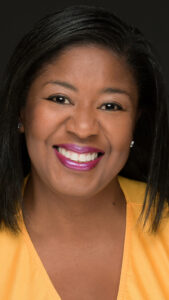
Oh, yes. Certainly the success of Some Like It Hot and being this character has inspired me to to think bigger. But also the shift in our country has certainly inspired me. I am a part of Black Theater United, which is a group that is very interested in protecting Black artists lives – not just in theater, but also in the world, in the community. So my shift is basically learning how to be more like Sweet Sue in making decisions that affect other people; going on journeys that empower people.
I’m not really sure what that means artistically, other than maybe I want to write more. I want to create more and create more vehicles and stories that will tell some of the unsung and untold stories of Black people and of other people disenfranchised groups.
There is, of course, the title song Some Like It Hot, but would some like it Tony as well?
Oh gosh, who wouldn’t like that? In the last two months the things that have opened up have been very exciting. I’m so glad that Broadway’s back, first of all, and that it is back with so many choices. I’d be crazy to say we don’t want Tonys. Of course we do! But if we don’t, the work that we’re doing is great work and I’m very proud of it: the music, the costumes, the story, the book, the actors, the dancers. Everything really is wonderful and hot.
We say to the audience and those that come in, come commune with us. Because we can gather in a space together, we can laugh together and there’s space for you inside this theater and in the world. So go claim your space. I’m hoping we get lots of Tonys. But even if we don’t, I’m hoping people come in and they get that message. I can take that away because that’s what’s blessed me. There is space for me, for my talent, the space for a full-figured woman, an older woman. There’s space for multigenerational groups in this particular show. We get to see all of that diversity, all of that equity. That’s what is most important. I hope the Tony people see that and say, Wow, there’s something very special about this production.
I want to take you back to the end of the first act of Ragtime in 1997, when I believe you made a phone call to your mother. You said, “Oh, my God, this is what I so want to do. I know I’m in the right place.” 26 years later how do you feel at the end of each performance of Some Like It Hot? I’m assuming you aren’t having second thoughts about this being the right place for you.
I feel like I am literally living my dream every day. It hasn’t always been as wonderful and as fulfilling as it is right now, but it has always been the goal. If I could make that phone call to my mother right now, which I can’t as she has passed, but every day I feel like that little girl 26 years ago making that phone call.
I got to meet and work with [Ragtime lyricist and composer] Lynn Ahrens and Stephen Flaherty years later at Dessa Rose. Ragtime changed my life. I moved here to be a performer. There wasn’t a question prior to or how I was going to make it happen. That afternoon in the theater certainly solidified it for me. I knew that whatever I had to do that on that stage was where I wanted to be. The fact that I’ve gotten to do that is a gift to me. It’s something that I don’t take lightly and I’m forever grateful. No change of plans. That’s where I want to be. It fulfills me in a way that nothing other than maybe motherhood has done. I’m just grateful. Just grateful.
To see the full interview with NaTasha Yvette Williams, please go here.
Main Photo: NaTasha Yvette Williams at the opening night of Some Like it Hot (Photo by Chad Kraus)











